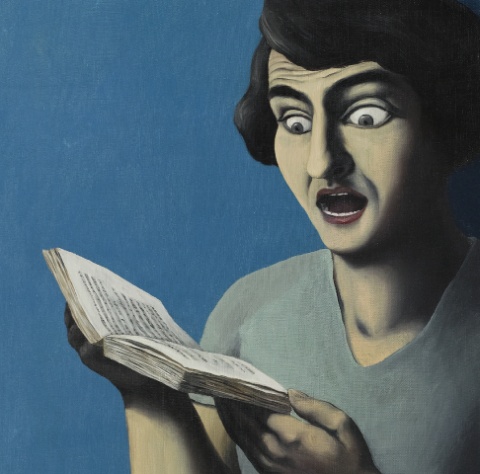Astounding! Readers use their imagination when reading
 La Lectrice Soumise (René Magritte)
La Lectrice Soumise (René Magritte)
Everyday, in spite of the critics, neuroimaging keeps on producing vast increases in our understanding of culture. This week, for example, Boing Boing [1] and Physorg [2] enthusiastically comment on an fMRI study "forthcoming in Psychological Science" (though not yet online on the journal's website). The study discovered that "readers build vivid mental simulations of narrative situations".
For those unacquainted with the subtleties of Neuroscience, the authors explain: "Readers use perceptual and motor representations in the process of comprehending narrated activity, and these representations are dynamically updated at points where relevant aspects of the situation are changing. Readers understand a story by simulating the events in the story world and updating their simulation when features of that world change."
In other words, when you read the following sentence:
"It was a dark and stormy night"
You actually think of a night that is dark and stormy. You build, so to speak, a mental picture of it. And that image is in your head - in your brain. But there's more.
When you read the rest of the sentence:
"It was a dark and stormy night - the rain fell in torrents"
You update your mental picture of that dark and stormy night, in order to include rain falling in torrents.
This, of course, is just a possible interpretation of the fMRI data. Let's not get too far ahead - this is science after all. Other studies might reveal that in fact you imagine rainbows and sunshine. Or maybe nothing at all. Actually, you might not understand english - you might even be unable to read. In both these cases you would not mentally picture a dark and stormy night. Or would you? We're only dealing with conjectures so far: we need more science of this kind. That study was only the beginning.
fMRI scanning costs around 500 dollars an hour. Marcel Proust's Sur la lecture is downloadable for free here.
[1] Your brain on fiction: we simulate action we read in narrative
[2] Readers build vivid mental simulations of narrative situations, brain scans suggest



Simon Barthelme 4 February 2009 (13:30)
My auditory lobe is simulating the sound of an open door being pushed. No mention of mirror neurons in the press release? What's up with that?